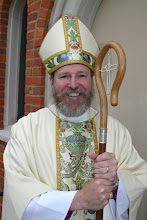 A room with a view.
A room with a view.For the last two and a half weeks, this has been mine. The above photograph is taken from the one window in my quite comfortable single dorm room in Rutherford College, at the University of Kent. As you can see, I look out on a huge blue tent, appropriately named The Big Top, in which are held all worship services and plenary sessions of the Lambeth Conference, accompanied by its conveniently situated Portaloos in the foreground. Almost every time there is something going on in The Big Top, I am in it (the tent, that is), save for the twice-daily choir rehearsals which are a delight to hear through my open window. Therefore, it is both a graceful and a quiet scene upon which I look.
It would be shamefully easy to make the obvious comments about this sort of tent and the activities one usually associates with it, so I will. While Lambeth 2008 has decidedly not been a circus, one does spot the occasional ecclesiastical acrobat, clown, side-show artist, ringleader, and lion-tamer. I confess to have even taken a turn as the guy who follows the theological elephant with a wheelbarrow and broom.
Most of the time, however, I have found myself feeling a number of things we often go to the circus to feel: awe, excitement, admiration, empathy, delight, joy, and wonder. In The Big Top have been transported by moving liturgies, inspired by stirring homilies, challenged by the reflections of the Archbishop of Canterbury and other lecturers, brought to tears by images from the cyclone in Myanmar, and warmed by the companionship of Christians from around the world who have gathered daily with me to be fed by Jesus.
One circus character who is missing is the one who stands out in the street yelling, “Come one, come all!” In the Anglican Communion we are some distance from an authentic invitation of that universal an inclusivity. Come one, come all. I understand far better today than I did when I unpacked my bag in the shadow of The Big Top why in some parts of the Communion it is impossible to make such an invitation, an invitation to all roles in the Church without regard to human sexuality, and why in other parts of the Communion it is impossible not to. That more full understanding has not resulted in my own convictions on these matters being changed. Indeed, each time I take in the view from my room I can’t help but see those who have been left outside the tent, or only invited in if they will refrain from being fully the persons they know God has made them to be. But it has resulted in my turning more helplessly and hopefully to God to lead us forward.
Much of the hurt in the Church that is caused by our conflicting attitudes about homosexuality and our actions toward homosexuals is exactly where it ought to be, in the Church. The Church is made for the hurt of the world. Yet a considerable amount of it remains outside. Perhaps what most separates us from the healing God yearns to give us are the tent flaps.



